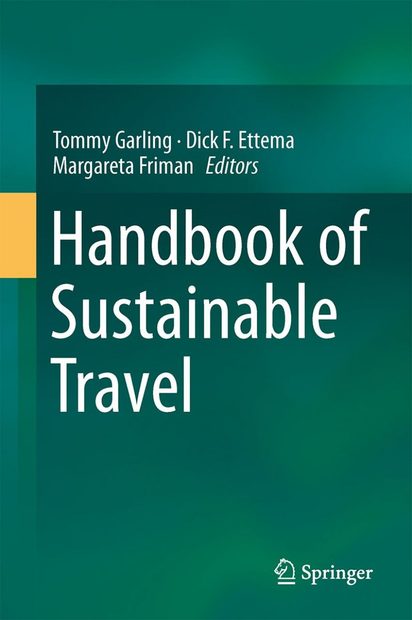By: Tommy Garling(Editor), Dick F Ettema(Editor), Margareta Friman(Editor)
357 pages, 7 colour & 21 b/w illustrations, 19 tables
![Handbook of Sustainable Travel Handbook of Sustainable Travel]()
Click to have a closer look
About this book
Contents
Customer reviews
Related titles
About this book
Handbook of Sustainable Travel gathers distinguished researchers on travel behavior from a variety of disciplines, to offer state-of-the-art research and analysis encompassing environmental, traffic and transport psychology; transport planning and engineering; transport geography; transport economics; consumer services research; environmental sociology and well-being research. The underlying dilemma is that neither contemporary transportation technology nor contemporary travel behaviors are sustainable. The path toward sustainability is complex, because the consequences of changing technology and attempts to change travel preferences can be extreme both in economic and in social terms.
The Handbook of Sustainable Travel discusses transportation systems from environmental, social and economic perspectives, to provide insights into the underlying mechanisms, and to envisage potential strategies towards more sustainable travel. Part I offers an introduction to the subject, with chapters review historical and future trends in travel, the role of travel for a good society, and the satisfaction of travelers with various features of travel options. Part II proceeds from the fact that the car is the backbone of today's transportation system, and that a break with automobiles is likely to be necessary in the future. Contributors review the development of private car use, explore economic and psychological reasons why the car has become the primary mode of transport and discuss how this can be changed in the future. Part III addresses the social sustainability of travel, providing insights into the social costs and benefits of leisure, business and health travel, and taking into account the social costs or benefits of measures whose goals are primarily environmental. The authors provide the necessary background to judge whether proposed transport policies are also sustainable from a social perspective. Part IV highlights future alternatives to physical travel and surveys ecologically sustainable travel modes such as public transport and non-motorized modes of transportation.
Contents
Contents
Part I. Introduction
1. Overview of Handbook of Sustainable Travel
2. Spatial, Generational and Gendered Trends and Trend-Breaks in Travel
3. Benefits of Travel: Needs versus Constraints
4. Satisfaction and Travel Choices
Part II. Car Use
5. The Unsustainability of Car Use
6. Psychological Motives for Car Use
7. Pricing Methods to Influence Car Use
8. Social Marketing of Transportation
9. Psychological Contributions to the Development of Car-Use Reduction Interventions
10. Theoretical Underpinnings of Practical Strategies for Travel Behavior Change
Part III. Travel and Social Sustainability
11. Social Exclusion and Travel
12. Rose Tinted Memories as a Cause of Unsustainable Leisure Travel
13. Health and Travel
14. Business Travel
Part IV. Future Sustainable Travel
15. Do Future Land-Use Policies Increase Sustainable Travel?
16. Integrated Transportation Solutions: Visions of the Future
17. High Quality Public Transport: Gaining Acceptance of Bus Rapid Transit Systems
18. Non-Motorized Travel as a Sustainable Travel Option
19. E-Commerce and Sustainability
20. The Need to Change How People Think About the Consequences of Travel
Customer Reviews
By: Tommy Garling(Editor), Dick F Ettema(Editor), Margareta Friman(Editor)
357 pages, 7 colour & 21 b/w illustrations, 19 tables



































